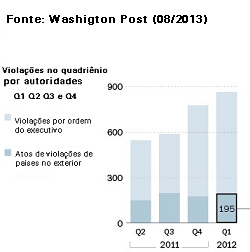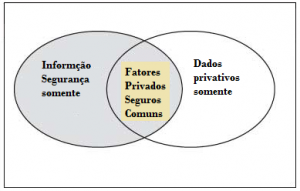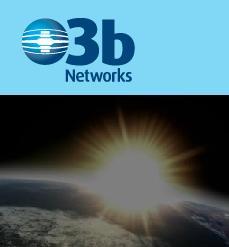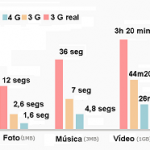
Arquivo para a ‘Eletronic Networks’ Categoria
Eletronic shop grows in Brazil
Commerce grows 24% The e-commerce grew 24% in Brazil in the first quarter of the year compared to the same period last year, says the study WebShoppers, released yesterday (21/08).
quarter of the year compared to the same period last year, says the study WebShoppers, released yesterday (21/08).
The Brazilians have made over 35 million in the first half, orders via the Internet (20% in value over the previous year) and the price of medical purchases also grew 4, giving the value of R $ 259.49.
The sectors are the record holders “Fashion and Accessories” with 13.7% of the total and appliances with 12.3%, then comes toiletries and cosmetics (12/2%), IT (9%) and books and subscriptions magazines (8.9%).
The semester until June 46.16 million people had already made at least one purchase online, but only 3.98 million were new consumers, against 4.64 million in the same period in the previous year, a decrease of 14% indicating a path market stabilization.
Irregularities in service in March 2012, several companies of electronic commerce (like Submarine, Americanas and Shoptime) had closed the virtual doors, but an injunction allowed them to return to work, but they are also subjected to Procon (Consumer Protection).
Privacit is violated in NSA
Are the initial findings of an internal audit, and write in Washington Post, last week,  the National Security Agency of the United States (NSA) “has violated the rules of privacy and exceeded his authority thousands of times a year since 2008, mainly through unauthorized surveillance targeting American and foreign intelligence in the U.S.. ”
the National Security Agency of the United States (NSA) “has violated the rules of privacy and exceeded his authority thousands of times a year since 2008, mainly through unauthorized surveillance targeting American and foreign intelligence in the U.S.. ”
Internal audit, dated May 2012, found 2,776 incidents or violations in which many were made without any “court order” american journal of capital guarantees.
The audit is particularly compromising U.S. government claims that post several surveillance actions were made with the consent of the government.
Firms Google, Facebook and Microsoft now deny the claim “unfettered access” to the U.S. government, but clearly cooperated earlier.
Called to give explanations, representatives of the Internet giants participated in a public hearing in the Senate on Thursday and declared: “There has been no large-scale access”, defended the company Bruno Magrani, manager of government relations Facebook , saying they were only 0.00002% of the requested information to Facebook, were requested directly by the U.S. government.
The government can deny, but vigilance happens, especially in Brazil, not because we are considered “special” to the U.S., but because we are a big hub in the global network.
Brazilian law PEC 479: broadband is a priority
The PEC 479 amends Article 5 of the Brazilian Constitution, to provide broadband  to the population should be a priority of the State, since “in contemporary society, universal access to information is consolidated as a key element for economic development and social nations”, according to its author Mr Sebastião Bala Rocha (PDT-AP-Brasil).
to the population should be a priority of the State, since “in contemporary society, universal access to information is consolidated as a key element for economic development and social nations”, according to its author Mr Sebastião Bala Rocha (PDT-AP-Brasil).
The reasoning is simple: to provide broadband to the population should be a priority of the State, since “in contemporary society, universal access to information is consolidated as a key element for economic and social development of nations” as stated by the deputy I proposed.
The PEC was proposed in 2010 and approved by the Constitutional Commission of Justice of the chamber in May 2011 and sees the social changes taking place, since “the internet, in particular, plays a crucial role in the construction of this new reality.”
The meeting is scheduled for tomorrow, 14/8/2013, 4 on the floor of the House of Representatives, and the SGP, the rapporteur Mrs Gorete Pereira (PR-EC), is approved, will be voted in two readings by the House still this month.
More about security and privacity
The issue is recurrent, since the internet (the middle physical´s initial) and Web (the popular application that started in the 90´s)  were expanding it became more frequent, and is now a priority issue on the destination Web.
were expanding it became more frequent, and is now a priority issue on the destination Web.
Now with former hacker official U.S. government announced the spying on American citizens and on other countries, it has become more important on the Web.
But security and privacy should not be treated as a single topic, although it is impossible to separate one from the other, in the privacy the individual knows what information people who allow them to be collected and published, and knows how to treat this information, but this should know how control this privacy.
According to an article from AT & T this information may be collected and would be correct to look at them.
Here comes the aspect of safety, only security should include factors that include physical security and human, ie “only security information” where factors including business, physical integrity of persons and / or disaster recovery may be included these factors, there is an international standard for this to ISO 17799.
Safeguarding customer information, this means that any site or social tool (not just Facebook, but mostly he) must protect the security, confidentiality and integrity of information from a “client”.
Management and Identity and Access Management (IAM, Identity and Access Management walks), which is undoubtedly the most critical factor of privacy, but not always given due attention because of the difficulty and cost of implementation.
Users are often employees, customers, suppliers, or a simple computational access to the environment and engage in corporate services without knowing what they do. The environments themselves are becoming increasingly complex, make offers “knowing” the taste of the client, exploring their consumption capacity and interconnecting applications.
The clouds are a particular danger for this invasion of privacy, SOA (Service oriented Architecture), since his own role as a service is to use the functions or services and not just traditional applications, and this causes the control access more difficult.
Security, coding, testing and application management is another risk factor, as application attacks have a great success due to the ease of vulnerabilities in most program code, programmers are famous for, the risks of programs written in Java, but weaknesses imply how many programs and services have been implemented.
Such findings may be accidental, such systems have recently been discovered in Apple’s iOS and Androids, showing that this is not the privilege of any company, but they are important as they are detected and remedied when companies advise their customers as part of a recall, but this is not done.
The safety aspects are not few, but should also include: protection and data encryption, protection against malware (viruses), managing and monitoring operational risk.
The network society and be
There are several authors, from Husserl and Heidegger claiming to be a return to the essence of man and also its relationship with all that is around you, in a way also the nature, although this is still neglected. You can delve into this topic referring to Levinas and Ricoeur, these most current, and also somehow Habermas and Morin, but we want to focus only on “networks”.
to be a return to the essence of man and also its relationship with all that is around you, in a way also the nature, although this is still neglected. You can delve into this topic referring to Levinas and Ricoeur, these most current, and also somehow Habermas and Morin, but we want to focus only on “networks”.
Castells is one of the main authors to discover this topic, especially if we think that he wrote in 1996, when “social networks” were just sketches and not popular. In one of the threads of its three volumes written that society would each see a more structured bipolarity between the network and be. It is amazing and no doubt a thorough review of the anthropological and ontological being, where man must overcome resistance and barriers to emerging society that would be the “network society”.
Castells(*) captures something essential is that this historical revision or change of being (and being that eludes him) would allow the emergence of a new society, where the sense of isolation and lack of identity, where there is a lack of consistent principles and values that may guide both the behavioral process as set guidelines for a new life of every being.
The author seems to put the company on the horizon of a true humanity, and thus we still can not let disappear the tension between the ideal (which is not virtual, because it has the potential of existence) and the real, which is the life of man as a historical being. The author does not guide the ontological way for a collective society, where models, actors and locations seem to balance the technological revolution mechanically consciences in order to give consistency and objectivity to the social roots of the “revolution.”
Returning to the first principles, with all the technology, it is in society and in man (for this so ontological) that the whole structure of society change and should emerge.
* Manuel Castells write “The Rise of the Network Society”.
As 4G worked in Confederation Cup
As expected there were many failures in communications and 4G data volume was late, the data in the World Cup final match Brazil vs Spain were 1.7 million mobile connections and more than 4.6 million data communications, including sending e-mails, photos and multimedia messages, with an average size of 0.5 MB.
Of total data communications in final match, about 4 million were on 3G and 650 000 by 4G networks, which results somewhere around 18%.
Cesar Alvarez, had gone to Rio de Janeiro to participate in a meeting of FIFA on telecommunications and even with Maracanã empty, failed to make a connection inside the stadium, and said that that day would have a meeting with the company to know what happened in the moments of concentration of people also were observed many flaws.
So he admitted that is not working as it should, but considering only the surroundings of the stadiums where companies that “whim” in image of this events, imagine what happens to the rest of the country.
The proposal of auction of LTE in the 2.5 GHz frequency predicted that 50% of the urban areas of the six host cities of the Confederations Cup would be covered from June 1, but did not.
Inexpensive satellite network
On board a Soyuz spacecraft was launched from  French Guiana yesterday four satellites that will operate the network O3b (Other 3 Billion), which will offer an internet connection of high-speed low-priced price for 3 billion people to 180 countries.
French Guiana yesterday four satellites that will operate the network O3b (Other 3 Billion), which will offer an internet connection of high-speed low-priced price for 3 billion people to 180 countries.
The idea emerged in 2007 from the mind of American Greg Wyler, pioneer of 3G telephony and founder of O3b Networks, traveled priate for Rwanda.
The satellite will cover a range of 45 degrees around of Ecuador Line, thus covering poor regions of Africa, Latin America, Southeast Asia, Australia and Oceania.
The network, the internet and the Web
Were years of the Cold War, the ongoing tension between the communist world led by the Soviet Union and the capitalist world led by the U.S., and the first idea of the electronic network was not having a central command so that he could keep the links in the event of destruction of some points by a war between the two blocks in tension.
So the network should be mounted without a central command, a system in which all points (network nodes) had autonomy and where the data transmitted in any direction or order not to lose the contents, the project was outlined ARPAnet Paul Baran, designed by Agency Advanced Research Projects (Advanced Research Projects Agency) of the U.S. government.
But the network went out of military control in 1970 and crisscrossed four U.S. universities, but in the next 4 years the number grew to 40. The exchange of messages and files becomes possible, and universities launch several projects, among them, the Project Gutenberg Michael Hart with the publication of books, the University of Illinois in 1971.
That same year, it created the first commercial network in the U.S., Telenet, as an access service.
The name has been used only in Internet 1982. In 1983, Vinton Cerf and Khan create the network communication protocol, TCP / IP (Transmission Control Protocol / Internet Protocol), the common basis of instructions and codes used by all computers connected to the network today.
But the Web as an application protocol only arrived in 1991, with the hypertext system, prophesied by Ted Nelson years before, and now implemented by Tim Berners-Lee, came the Web, the World Wide Web
Thus the metaphor of the network becomes years later an electronic means of communication the internet, and in the 90s a mode of communication between billion person who is the Web
Social networks were only possible within this universe of hypertext with the Internet as a medium.
O que a 4G pode proporcionar
 A copa das Confederações está aí, como anda seu celular, está fácil de fazer ligações, nas capitais dos estados que receberão jogos a promessa era de uma velocidade 10 vezes superior, mas e as antigas bandas como vão ?
A copa das Confederações está aí, como anda seu celular, está fácil de fazer ligações, nas capitais dos estados que receberão jogos a promessa era de uma velocidade 10 vezes superior, mas e as antigas bandas como vão ?
No leilão das frequências de 4G as operadoras que adquiriram os lotes nacionais do serviço “em todo” o país foram: Vivo, Claro, Tim e Oi.
O principal salto esperado com a chegada do 4G seria a velocidade da internet móvel, que a Anatel e diz que seria um aumento em 10 vezes na nova geração, mas o problema maior é o download de conteúdos.
O tempo de download nos serviços 3G para fotos que deveria ser na faixa de 3 segundos é de aproximadamente 12 segs, já o tempo para músicas sobe de 7 para 36 segundos, enquanto o de vídeos de aproximadamente 45 minutos para 3hs numa taxa de 1 GB de banda.
Ao analisar os dados que o mercado apresenta, surgiu uma faixa nova chamada de 3,5 G ou seja, pode ser que isto seja o 4G real ou o prometido do 3G mas que não aconteceu, uma vez que nunca se conseguiu observar esta seria uma faixa do 3G real, no quadro acima as taxas em “rosa” verificadas.
Os serviços (esperados) para o 4G são de 1,6 segundos para fotos, quase 5 segundos para músicas e 28 minutos para vídeos, mas será que vão funcionar ?
Vamos esperar os resultados, e as cobranças da ANATEL, agora terá gente de fora de olho e gente trabalhando (jornalistas e repórteres) que usarão a rede.
Colaboração e distribuição nas redes
 Colaboração não é descentralização, mais sim distribuição, porque a descentralização pode criar uma estrutura que apesar de coletiva é centralizada, muitos grupos que atuam em movimentos sociais trabalham assim, mas há uma coordenação central oculta que controla “o coletivo”.
Colaboração não é descentralização, mais sim distribuição, porque a descentralização pode criar uma estrutura que apesar de coletiva é centralizada, muitos grupos que atuam em movimentos sociais trabalham assim, mas há uma coordenação central oculta que controla “o coletivo”.
O livro The Wealth of networks, de Yochai Benkler (2006), demonstrou que a “esfera pública” interconectada pode potencialmente ser mais democrática que a mesma no “mass media”.
Isto parece óbvio já que o mass media foi criado numa estruturada vinculada a um poder político e econômico, de preferência os dois, mas até que ponto isto impediria a ação de multidão das novas mídias ?
O conceito de Benkler na mesma linha, mas um pouco diferente de Habermas, define a esfera pública como um “quadro de práticas que os membros de uma sociedade usam para comunicar questões que eles entendem ser de interesse público e que potencialmente requerem uma ação ou reconhecimento coletivos” (BENKLER, 2006, p. 177).
Não pode, portanto ser uma espécie de “proselitismo” para ganhar membros para “o grupo”, mas uma ação que a sociedade perceba como ter um “interesse público”, que são muitas: a distribuição da riqueza, o controle dos gastos públicos, o combate a corrupção ou mesmo a simples criação de uma ferramenta para algo coletivo, como dar carona, andar de bicicleta e muitas outras.
A atitude de colaboração é possível quando não centralizamos o poder.

